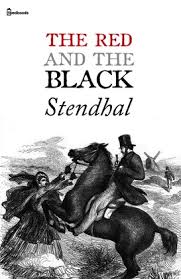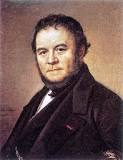The Red and the Black Page #22
Le Rouge et le Noir is a historical psychological novel in two volumes by Stendhal, published in 1830. It chronicles the attempts of a provincial young man to rise socially beyond his modest upbringing through a combination of talent, hard work, deception, and hypocrisy.
Julien quickly went away, and went up into the great forest, through which one can manage to get from Vergy to Verrières. He did not wish to arrive at M. Chélan's at once. Far from wishing to cramp himself in a new pose of hypocrisy he needed to see clear in his own soul, and to give audience to the crowd of sentiments which were agitating him. "I have won a battle," he said to himself, as soon as he saw that he was well in the forest, and far from all human gaze. "So I have won a battle." This expression shed a rosy light on his situation, and restored him to some serenity. "Here I am with a salary of fifty francs a month, M. de Rênal must be precious afraid, but what of?" This meditation about what could have put fear into the heart of that happy, powerful man against whom he had been boiling with rage only an hour back, completed the restoration to serenity of Julien's soul. He was almost able to enjoy for a moment the delightful beauty of the woods amidst which he was walking. Enormous blocks of bare rocks had fallen down long ago in the middle of the forest by the mountain side. Great cedars towered almost as high as these rocks whose shade caused a delicious freshness within three yards of places where the heat of the sun's rays would have made it impossible to rest. Julien took breath for a moment in the shade of these great rocks, and then he began again to climb. Traversing a narrow path that was scarcely marked, and was only used by the goat herds, he soon found himself standing upon an immense rock with the complete certainty of being far away from all mankind. This physical position made him smile. It symbolised to him the position he was burning to attain in the moral sphere. The pure air of these lovely mountains filled his soul with serenity and even with joy. The mayor of Verrières still continued to typify in his eyes all the wealth and all the arrogance of the earth; but Julien felt that the hatred that had just thrilled him had nothing personal about it in spite of all the violence which he had manifested. If he had left off seeing M. de Rênal he would in eight days have forgotten him, his castle, his dogs, his children and all his family. "I forced him, I don't know how, to make the greatest sacrifice. What? more than fifty crowns a year, and only a minute before I managed to extricate myself from the greatest danger; so there are two victories in one day. The second one is devoid of merit, I must find out the why and the wherefore. But these laborious researches are for to-morrow." Standing up on his great rock, Julien looked at the sky which was all afire with an August sun. The grasshoppers sang in the field about the rock; when they held their peace there was universal silence around him. He saw twenty leagues of country at his feet. He noticed from time to time some hawk, which launching off from the great rocks over his head was describing in silence its immense circles. Julien's eye followed the bird of prey mechanically. Its tranquil powerful movements struck him. He envied that strength, that isolation. "Would Napoleon's destiny be one day his?" CHAPTER XI AN EVENING Yet Julia's very coldness still was kind, And tremulously gently her small hand Withdrew itself from his, but left behind A little pressure, thrilling, and so bland, And slight, so very slight that to the mind, 'Twas but a doubt. Don Juan, c. I. st, 71. It was necessary, however, to put in an appearance at Verrières. As Julien left the curé house he was fortunate enough to meet M. Valenod, whom he hastened to tell of the increase in his salary. On returning to Vergy, Julien waited till night had fallen before going down into the garden. His soul was fatigued by the great number of violent emotions which had agitated him during the day. "What shall I say to them?" he reflected anxiously, as he thought about the ladies. He was far from realising that his soul was just in a mood to discuss those trivial circumstances which usually monopolise all feminine interests. Julien was often unintelligible to Madame Derville, and even to her friend, and he in his turn only half understood all that they said to him. Such was the effect of the force and, if I may venture to use such language, the greatness of the transports of passion which overwhelmed the soul of this ambitious youth. In this singular being it was storm nearly every day. As he entered the garden this evening, Julien was inclined to take an interest in what the pretty cousins were thinking. They were waiting for him impatiently. He took his accustomed seat next to Madame de Rênal. The darkness soon became profound. He attempted to take hold of a white hand which he had seen some time near him, as it leant on the back of a chair. Some hesitation was shewn, but eventually the hand was withdrawn in a manner which indicated displeasure. Julien was inclined to give up the attempt as a bad job, and to continue his conversation quite gaily, when he heard M. de Rênal approaching. The coarse words he had uttered in the morning were still ringing in Julien's ears. "Would not taking possession of his wife's hand in his very presence," he said to himself, "be a good way of scoring off that creature who has all that life can give him. Yes! I will do it. I, the very man for whom he has evidenced so great a contempt." From that moment the tranquillity which was so alien to Julien's real character quickly disappeared. He was obsessed by an anxious desire that Madame de Rênal should abandon her hand to him. M. de Rênal was talking politics with vehemence; two or three commercial men in Verrières had been growing distinctly richer than he was, and were going to annoy him over the elections. Madame Derville was listening to him. Irritated by these tirades, Julien brought his chair nearer Madame de Rênal. All his movements were concealed by the darkness. He dared to put his hand very near to the pretty arm which was left uncovered by the dress. He was troubled and had lost control of his mind. He brought his face near to that pretty arm and dared to put his lips on it. Madame de Rênal shuddered. Her husband was four paces away. She hastened to give her hand to Julien, and at the same time to push him back a little. As M. de Rênal was continuing his insults against those ne'er-do-wells and Jacobins who were growing so rich, Julien covered the hand which had been abandoned to him with kisses, which were either really passionate or at any rate seemed so to Madame de Rênal. But the poor woman had already had the proofs on that same fatal day that the man whom she adored, without owning it to herself, loved another! During the whole time Julien had been absent she had been the prey to an extreme unhappiness which had made her reflect. "What," she said to herself, "Am I going to love, am I going to be in love? Am I, a married woman, going to fall in love? But," she said to herself, "I have never felt for my husband this dark madness, which never permits of my keeping Julien out of my thoughts. After all, he is only a child who is full of respect for me. This madness will be fleeting. In what way do the sentiments which I may have for this young man concern my husband? M. de Rênal would be bored by the conversations which I have with Julien on imaginative subjects. As for him, he simply thinks of his business. I am not taking anything away from him to give to Julien."
Translation
Translate and read this book in other languages:
Select another language:
- - Select -
- 简体中文 (Chinese - Simplified)
- 繁體中文 (Chinese - Traditional)
- Español (Spanish)
- Esperanto (Esperanto)
- 日本語 (Japanese)
- Português (Portuguese)
- Deutsch (German)
- العربية (Arabic)
- Français (French)
- Русский (Russian)
- ಕನ್ನಡ (Kannada)
- 한국어 (Korean)
- עברית (Hebrew)
- Gaeilge (Irish)
- Українська (Ukrainian)
- اردو (Urdu)
- Magyar (Hungarian)
- मानक हिन्दी (Hindi)
- Indonesia (Indonesian)
- Italiano (Italian)
- தமிழ் (Tamil)
- Türkçe (Turkish)
- తెలుగు (Telugu)
- ภาษาไทย (Thai)
- Tiếng Việt (Vietnamese)
- Čeština (Czech)
- Polski (Polish)
- Bahasa Indonesia (Indonesian)
- Românește (Romanian)
- Nederlands (Dutch)
- Ελληνικά (Greek)
- Latinum (Latin)
- Svenska (Swedish)
- Dansk (Danish)
- Suomi (Finnish)
- فارسی (Persian)
- ייִדיש (Yiddish)
- հայերեն (Armenian)
- Norsk (Norwegian)
- English (English)
Citation
Use the citation below to add this book to your bibliography:
Style:MLAChicagoAPA
"The Red and the Black Books." Literature.com. STANDS4 LLC, 2025. Web. 12 Mar. 2025. <https://www.literature.com/book/the_red_and_the_black_201>.








Discuss this The Red and the Black book with the community:
Report Comment
We're doing our best to make sure our content is useful, accurate and safe.
If by any chance you spot an inappropriate comment while navigating through our website please use this form to let us know, and we'll take care of it shortly.
Attachment
You need to be logged in to favorite.
Log In